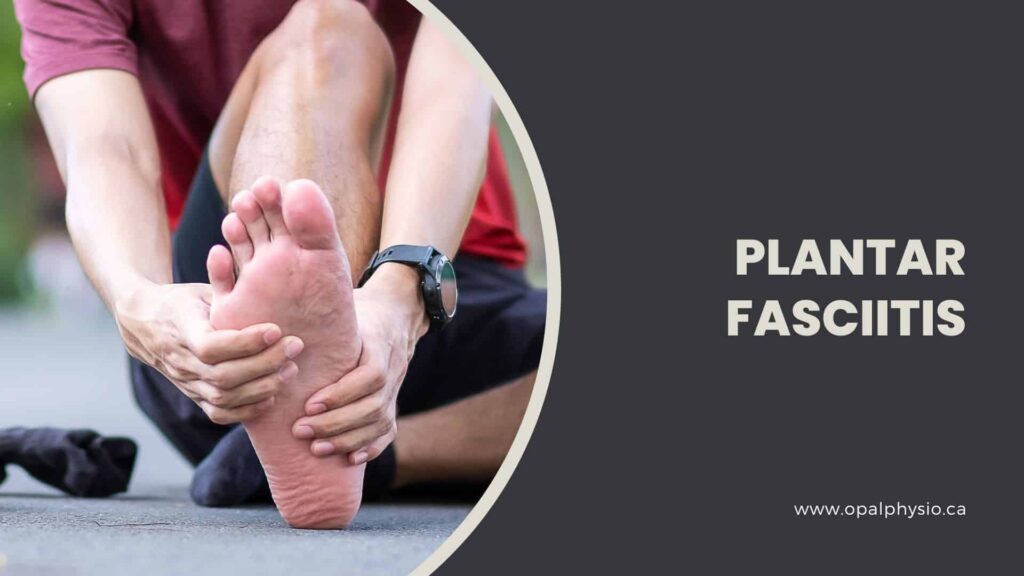Plantar Fasciitis Treatment In Langley
Plantar fasciitis is a common foot condition that causes pain in the heel and arch of the foot. Plantar fasciitis causes inflammation, pain, and swelling in the connective tissue that supports the bottom of your foot.
Physiotherapy for plantar fasciitis treatment
At Opal Physio, our expert physiotherapists are dedicated to providing comprehensive and effective treatment for individuals suffering from this debilitating condition. Our goal is to help you regain mobility, reduce pain, and get back to your daily activities with ease.

What is plantar fasciitis?
Plantar fasciitis is the inflammation of the plantar fascia, a thick band of tissue that connects the heel bone to the toes. This tissue supports the foot arch and acts as a shock absorber. It also helps stabilize and support your weight during activities.
When the plantar fascia is overstressed or overused, it can become inflamed and cause pain in the heel and arch of the foot. This condition is common among runners, people who are overweight, and those who wear shoes with inadequate support.
Although plantar fascia pain is usually of gradual onset, it can get quite painful over time if not treated promptly.
Symptoms of plantar fasciitis
- Sharp pain in the heel and arch of the foot, especially when taking the first steps in the morning or after prolonged periods of rest
- Morning heel pain which usually improves with activity
- Pain that increases with prolonged standing or walking
- Swelling or tenderness in the heel area
- Sharp shooting pain in the heel
- Pain is usually relieved by stretching and massage
Common causes of plantar fasciitis
Common causes of plantar fasciitis include:
- Overuse
- Repetitive motions
- Weight gain or obesity
- High heels use or wearing improper footwear.
- Activities that place stress on the foot, which include prolonged standing, walking, jumping and running
- Injuries to the foot
- Heel spur
- Genetics
- Foot structures: Flat feet or high arches, tight calf muscles and foot overpronation.
- Certain diseases or health conditions like lupus or rheumatoid arthritis can cause plantar fasciitis.
Tips for plantar fascia pain
You can help plantar fascia pain by performing these simple things at home:
- Rest the foot and avoid activities that cause pain.
- Applying an ice pack to the foot is effective in reducing pain.
- Also, try using an over-the-counter topical cream or ointment and massage the foot to help reduce pain and swelling.
- Perform gentle calf and foot stretching exercises.
- Gradually resume activities as pain improves.
- Using night splints to support the plantar fascia can be of help.
Physiotherapy treatment for plantar fasciitis in Langley
Our experienced physiotherapists will thoroughly assess your condition and develop a personalized plantar fasciitis treatment plan to address your needs.
Physiotherapy treatment is aimed to help decrease inflammation and reduce pain. The goal is to improve flexibility and progress through gradual strength training in the surrounding lower extremity muscles, which will help improve your overall mobility and function.
Our physiotherapist can help identify any underlying causes of your plantar fasciitis and recommend appropriate treatment options. Physiotherapy treatment for plantar fasciitis may include the following:
- Manual therapy: Our physiotherapists will use hands-on techniques, including joint and soft tissue mobilization to the plantar fascia, helping to alleviate pain and improve flexibility.
- Exercise prescription: We will provide a customized exercise program that includes a stretching and strengthening program designed to strengthen your foot and lower leg muscles, improve flexibility, and promote healing of the plantar fascia.
- Gait training: Our therapist assesses your walking and provides instruction on how to modify your gait to reduce stress on the plantar fascia
- Orthotics and footwear advice: Our physiotherapists will assess your footwear and may recommend getting orthotic inserts or supportive shoes to help alleviate pain and provide proper support for your feet.
- Taping: We may use taping techniques to support the plantar fascia and reduce stress on the affected area, providing immediate relief from pain.
- Modalities: Techniques such as ultrasound or low-level laser therapy may promote healing, reduce inflammation, and alleviate pain.
- Education and Lifestyle Modification: Our physiotherapists will guide how to modify your daily activities and exercise routines to prevent further injury and promote long-term recovery.
Physiotherapy for plantar fasciitis can be the best treatment approach for that you can get to reduce pain and improve your function. Physical therapy can help to stretch and strengthen the muscles and tissues in the foot, which can help to reduce pain. Our location has physiotherapists who can help you with plantar fasciitis. Our treatments are customized to your condition. If you have plantar fasciitis, please book an appointment with us today.
Book an Appointment Today
Don’t let plantar fasciitis hold you back from enjoying your daily activities. Contact Opal Physiotherapy Clinic today to schedule an appointment with one of our proficient physiotherapists and start your journey toward pain-free living.
